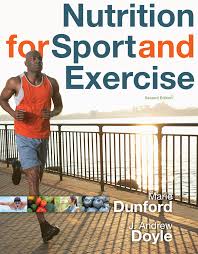In Stock
Test Bank For Nutrition for Sport And Exercise 2nd Edition by Marie Dunford
Digital item No Waiting Time Instant DownloadISBN 10: 0840068298ISBN 13: 9780840068293
Original price was: $95.00.$35.00Current price is: $35.00.
Test Bank For Nutrition for Sport And Exercise 2nd Edition by Marie Dunford
Test Bank for Nutrition for Sport & Exercise 2e
Chapter 3 – Energy Systems and Exercise
Learning Objectives
1. Describe the characteristics of the creatine phosphate, anaerobic glycolysis, and oxidative phosphorylation energy systems.
2. Evaluate creatine supplements based on legality, ethics, safety, and effectiveness
3. Compare and contrast the three energy systems and give examples of physical activities, exercise, or sports in which each is the predominant energy system.
4. Outline the process of carbohydrate, fat, and protein (amino acid) oxidation.
5. Explain the response of oxygen consumption to steady-state, sub-maximal exercise
6. Explain the concept of maximal oxygen consumption and become familiar with relative values of VO2 max.
7. Explain the concept of respiratory exchange ratio and describe the process of determining the percentage of fat and carbohydrate fuel utilization.
Question Information Key
ANS = correct answer REF = page reference
DIF = question classification OBJ = learning objective
Multiple Choice
1. What is creatine phosphate (CrP)?
a. An amino acid
b. A nitrogen-containing compound made from amino acids
c. A phosphate-containing protein
d. A byproduct of the breakdown of creatinine
ANS: b DIF: Recall/comprehension REF: 70 OBJ: 3.1
2. Which of the following is a true statement regarding the function of creatine phosphate (CrP)?
a. It functions in exactly the same way as ATP; there is just less CrP in cells
b. CrP directly powers muscle contraction
c. CrP rapidly replenishes ATP
d. All of the above
ANS: c DIF: Recall/comprehension REF: 70 OBJ: 3.1
3. Based on dietary intake only, whom would you expect to have the lowest amount of muscle creatine?
a. Vegetarians
b. Red meat eaters
c. Fish eaters
d. No differences would be expected based on dietary intake
ANS: a DIF: Recall/comprehension REF: 70-71 OBJ: 3.1
4. How many chemical steps are required for the rephosphorylation of ATP by creatine phosphate?
a. 1
b. 3
c. 18
d. 124
ANS: a DIF: Recall/comprehension REF: 71 OBJ: 3.1
5. What is the effect on muscle ATP and creatine phosphate (CrP) when an athlete performs very-high-intensity exercise for a very short period of time (e.g., 10 seconds)?
a. ATP and CrP both decline rapidly and in concert with each other.
b. Neither ATP nor CrP decline much because of the very short duration of exercise.
c. CrP declines rapidly but there is virtually no decline in ATP.
d. ATP declines then plateaus while CrP declines substantially.
ANS: d DIF: Analysis REF: 71 OBJ: 3.1
6. What is the major factor that limits the use of the creatine phosphate energy system?
a. The pH of the cell increases
b. Creatine phosphate can be depleted
c. Muscle glycogen can be depleted
d. Increased oxygen consumption
ANS: b DIF: Comprehension REF: 71 OBJ: 3.1
7. If creatine phosphate is nearly depleted in skeletal muscle by high-intensity exercise, how is it rephosphorylated?
a. By consuming creatine as a dietary supplement
b. By consuming ATP as a dietary supplement
c. From ATP generated anaerobically by glycolysis
d. From ATP generated aerobically by oxidative phosphorylation
ANS: d DIF: Comprehension REF: 72-73 OBJ: 3.1
8. If creatine phosphate is nearly depleted in skeletal muscle by high-intensity exercise, approximately how long does it take to restore creatine phosphate levels?
a. 1-2 seconds
b. 1-2 minutes
c. 1-2 hours
d. 1-2 days
ANS: b DIF: Recall/comprehension REF: 74 OBJ: 3.1
9. Those who respond to creatine supplementation could expect that muscle creatine phosphate concentrations would increase by approximately ____%.
a. 5
b. 20
c. 37
d. 50
ANS: b DIF: Recall/comprehension REF: 74 OBJ: 3.2
10. Which of the following is a true statement regarding creatine supplementation?
a. Has been shown to be beneficial for both strength and endurance athletes
b. Has a direct effect on improving strength, speed, and power for strength athletes
c. Causes dehydration and muscle cramping in strength athletes
d. Allows strength and power athletes to sustain high-intensity training
ANS: d DIF: Recall/comprehension REF: 74 OBJ: 3.2

Reviews
There are no reviews yet.